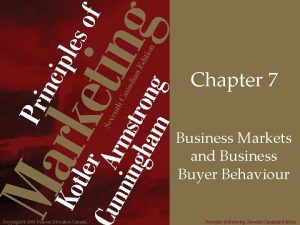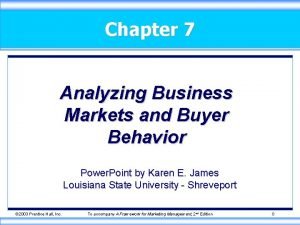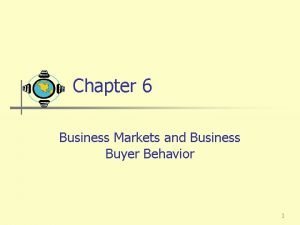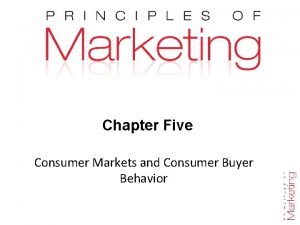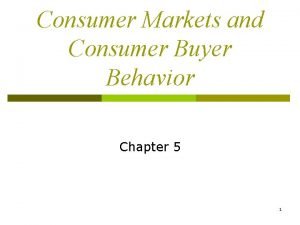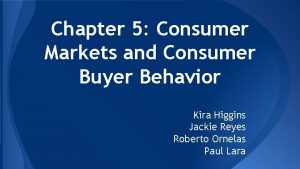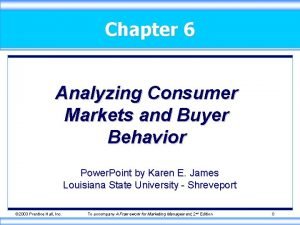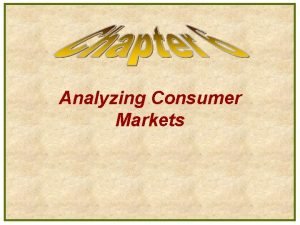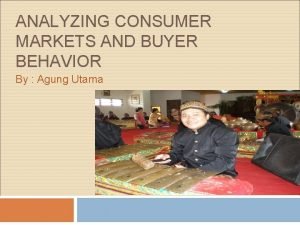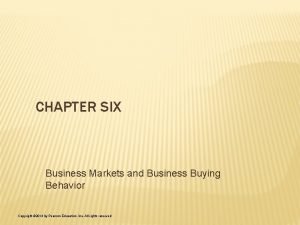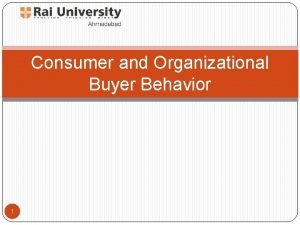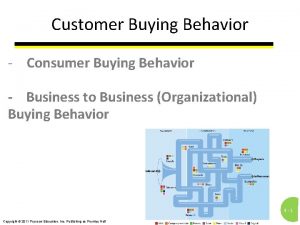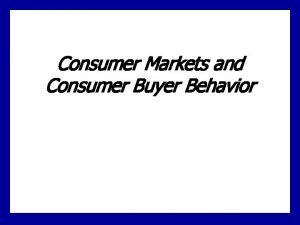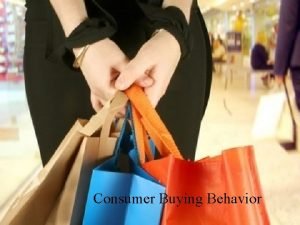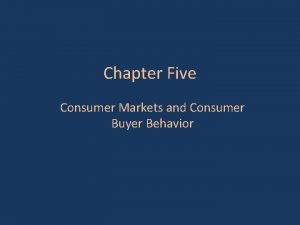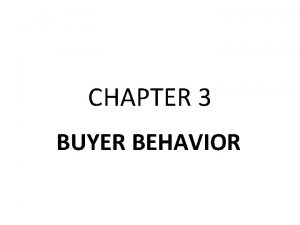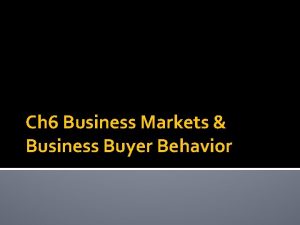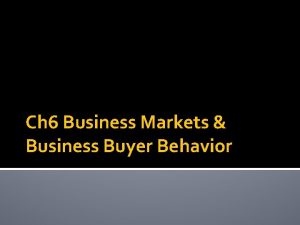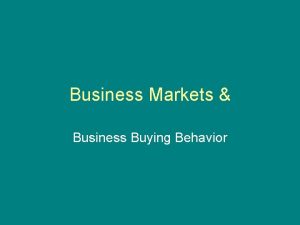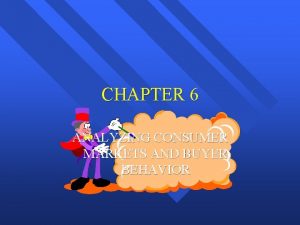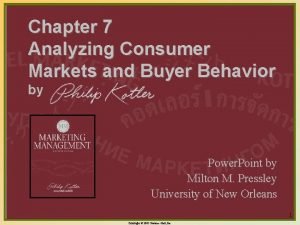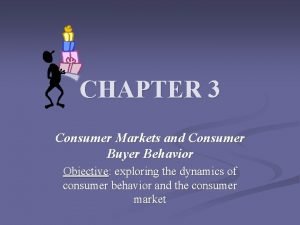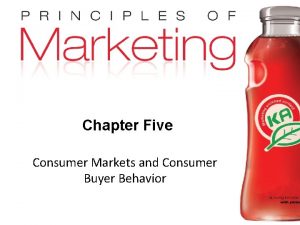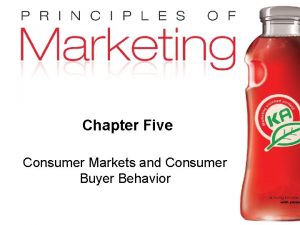Business Markets and Business Buyer Behavior Chapter 6

Business Markets and Business Buyer Behavior Chapter 6

Definition Business Buyer Behavior: § The buying behavior of organizations that buy goods and services for use in the production of other products and services that are sold, rented, or supplied to others. § Also included are retailing and wholesaling firms that acquire goods for the purpose of reselling or renting them to others at a profit. 6 -1 Goal 1: Define the business market

Characteristics of Business Markets § Sales in the business market far exceed sales in consumer markets. § Business markets differ from consumer markets in many ways. • Marketing structure and demand • Nature of the buying unit • Types of decisions and the decision process 6 -2 Goal 1: Define the business market

Business Markets Characteristics Marketing Structure and Demand Nature of the Buying Unit Types of Decisions and the Decision Process Compared to consumer markets: § Business markets • have fewer but larger customers § Business customers • are more geographically concentrated § Demand is different • Demand is derived • Demand is price inelastic • Demand fluctuates more Goal 1: Define the business market 6 -3

Business Markets Characteristics Marketing Structure and Demand Nature of the Buying Unit Types of Decisions and the Decision Process Compared to consumer purchases: § Involve more buyers in the decision process § More professional purchasing effort 6 -4 Goal 1: Define the business market

Business Markets Characteristics Marketing Structure and Demand Nature of the Buying Unit Types of Decisions and the Decision Process Compared to consumer purchases § More complex buying decisions § The buying process is more formalized § Buyers and sellers work more closely together and build long-term relationships 6 -5 Goal 1: Define the business market

Business Buyer Behavior Major Types of Buying Situations § Straight rebuy • Reordering without modification § Modified rebuy • Requires modification to prior purchase § New task • First-time purchase 6 -6 Goal 1: Define the business market

Business Buyer Behavior Systems Selling § Buying a packaged solution to a problem from a single seller. § Often a key marketing strategy for businesses seeking to win and hold accounts. 6 -7 Goal 1: Define the business market

Business Buyer Behavior Buying Center § The decision-making unit of a buying organization § Includes all individuals and units that participate in the decision making 6 -8 Goal 1: Define the business market

Business Buyer Behavior Members of the Buying Center Users Buyers Influencers Deciders Gatekeepers 6 -9 Goal 1: Define the business market

Major Influences on Business Buyers Key Factors Environmental Organizational Interpersonal Individual Economic trends Supply conditions Technological, political and competitive changes Culture and customs 6 - 10 Goal 2: Identify the major factors that influence business buyer behavior

Major Influences on Business Buyers Key Factors Environmental Organizational Interpersonal Individual Objectives Policies Procedures Organizational structure Systems 6 - 11 Goal 2: Identify the major factors that influence business buyer behavior

Major Influences on Business Buyers Key Factors Environmental Organizational Interpersonal Individual Influence of members in the buying center § § Authority Status Empathy Persuasiveness 6 - 12 Goal 2: Identify the major factors that influence business buyer behavior

Major Influences on Business Buyers Key Factors Environmental Organizational Interpersonal Individual Personal characteristics of members in the buying center § § § Age and income Education Job position Personality Risk attitudes Buying styles 6 - 13 Goal 2: Identify the major factors that influence business buyer behavior

Stages in the Business Buying Process Stage 1: Problem Recognition Stage 2: General Need Description Stage 3: Product Specification § Value analysis helps to reduce costs Stage 4: Supplier Search § Supplier development 6 - 14 Goal 3: List and define the steps in the business buying decision process

Stages in the Business Buying Process Stage 5: Proposal Solicitation Stage 6: Supplier Selection Stage 7: Order-Routine Specification § Blanket contracts are often used for maintenance, repair and operating items. Stage 8: Performance Review 6 - 15 Goal 3: List and define the steps in the business buying decision process

Business Buying on the Internet § E-procurement is growing rapidly § Online auctions and online trading exchanges (e-marketplaces) account for much of the online purchasing activity § E-procurement offers many benefits: • Access to new suppliers • Lower purchasing costs • Quicker order processing and delivery 6 - 16 Goal 3: List and define the steps in the business buying decision process

Institutional and Government Markets Institutional Markets § Consist of churches, schools, prisons, hospitals, nursing homes and other institutions that provide goods and services to people in their care. 6 - 17 Goal 4: Compare the institutional and government markets

Institutional and Government Markets Institutional Markets § Often characterized by low budgets and captive patrons. § Marketers may develop separate divisions and marketing mixes to service institutional markets. 6 - 18 Goal 4: Compare the institutional and government markets
- Slides: 19

